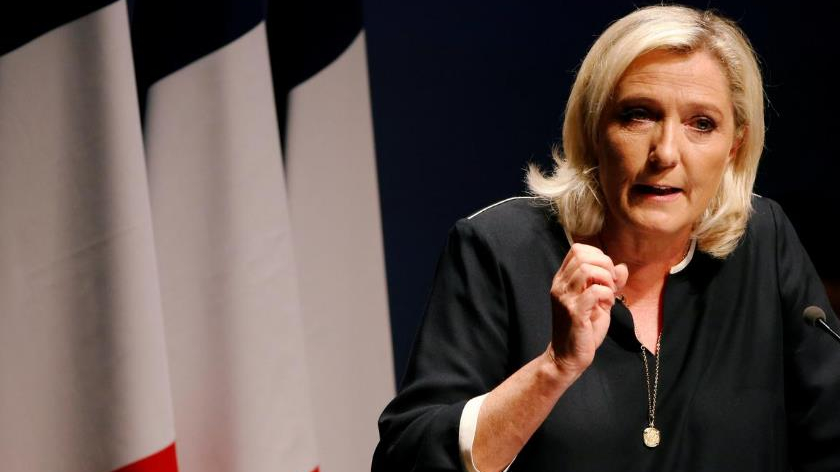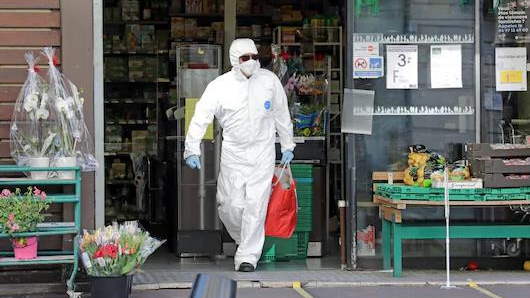Editor's note: Freddie Reidy is a freelance writer based in London. He studied history and history of art at the University of Kent, Canterbury, specializing in Russian history and international politics. The article reflects the author's opinions and not necessarily the views of CGTN.
In a time-honored fashion, French President Emmanuel Macron turned to the international stage in the wake of a dismal performance by his party in French regional elections last week. The French president shifted his attention to a German proposal of an increased dialogue with Moscow. Such an initiative has long been one of Chancellor Merkel's foreign policy cornerstones and Macron's support of the initiative indicates an unofficial ideological succession plan as Merkel prepares to leave office.
The Financial Times quoted a German spokesman as saying "that it is a common practice for Germany and France to coordinate closely before EU summits and draw up proposals."
While this may be the case, French support in the initiative is vital to Merkel's strategy continuity but also an opportunity for Macron to place himself at the fulcrum of EU politics, affording him the opportunity to fulfill his oft-articulated European vision.

France's far-right leader Marine Le Pen delivers a speech for the next year's municipal elections in an end-summer annual address to partisans in Frejus, France, September 15, 2019. /VCG
France's far-right leader Marine Le Pen delivers a speech for the next year's municipal elections in an end-summer annual address to partisans in Frejus, France, September 15, 2019. /VCG
Such a stratagem is purely academic if the results of the regional election are not rapidly reversed ahead of next year's presidential election. Indeed, the incumbent president has a mountain to climb if he is to become the first president in 20 years to be elected for a second term.
Macron's La République En Marche (LREM) party under-performed so severely that it failed to make the second round of voting this weekend in four of France's 13 regions. The French president's main rival is Marine Le Pen of the far-right Rassemblement National. Le Pen's party also performed poorly last week.
The challenge for Macron though is that in order to defeat Le Pen, he will have to earn the right to face the right-wing veteran as the candidate for the center-right. It has long been an agreement that the leading left and center-right parties will pool their votes in a bid to prevent the far-right party from securing power.
Such an arrangement most famously took place in 2002 when Socialist candidate Lionel Jospin fell third to Marine Le Pen's father, Jean-Marie Le Pen in the runoff. Consequently, the Socialist Party threw their weight behind center-right candidate Jacques Chirac, the last president to hold office successively.
Macron himself was able to capitalize on fragmentation during the 2016 campaign, having left the Socialist Party and forming his own party in order to capitalize on front-runner Francoise Fillon's scandal-hit campaign and the under-performance of his former party's candidate. Thus demonstrating the risk he faces in a broken field.
Such a fragmentation has indeed given way to a packed field of potential rivals of both Macron and the far right, as Professor Vincent Martigny of the University of Nice told the FT, "The problem is that one thing has not been settled – how to organize the primary between different leaders who are anti-Macron on the right."
One potential rival to Macron is Xavier Bertrand, a former minister and now leader of the Hauts-de-France region, who has successfully melded the support of France's northern industrial heartlands with a center-right identity.
Wise to the "anyone but Le Pen" principle, Bertrand is keen to anoint himself as the antidote to the far right. "I know I have a special responsibility to make them (Rassemblement National) retreat… we've unlocked the jaws of the National Front in order to smash them here."

A man wearing protective suit and face mask leaves a supermarket after shopping in Nice, as a lockdown is imposed to slow the rate of COVID-19 in France. /Reuters
A man wearing protective suit and face mask leaves a supermarket after shopping in Nice, as a lockdown is imposed to slow the rate of COVID-19 in France. /Reuters
Bertrand does have justification for his claim too, reversing an electoral defeat to Rassemblement National (RN) and securing 41 percent of the vote vs. 24 percent for RN.
Meanwhile, LREM's party leader Stanislas Guerini, stuck an almost deafest tone when speaking to France Inter radio: "It is a reminder that we, as the presidential majority, have work to do to build up a local presence, which is a long and laborious task that doesn't happen in one election."
As France emerges from COVID-19, Macron will need to refocus his attention on domestic issues and allay what analyst Sophie Virginie described to France 24 as "a lack of serious effort to put down roots at a local level," which translates to the electorate as disconnection.
Macron's presidency and European ambitions may be on the line, but the EU too, potentially faces a future where its two leading heads of state are relative novices or even, extremists questioning its very existence.
Former Sarkozy-era justice minister Rachida Dati though, brutally summed up the challenge faced by the president's party, describing it as "a party of traitors from the left and traitors from the right, which is nothing without Emmanuel Macron."
Macron must therefore seek to lead a broad coalition to victory or face defeat with a grouping of the politically displaced.
(If you want to contribute and have specific expertise, please contact us at opinions@cgtn.com.)

